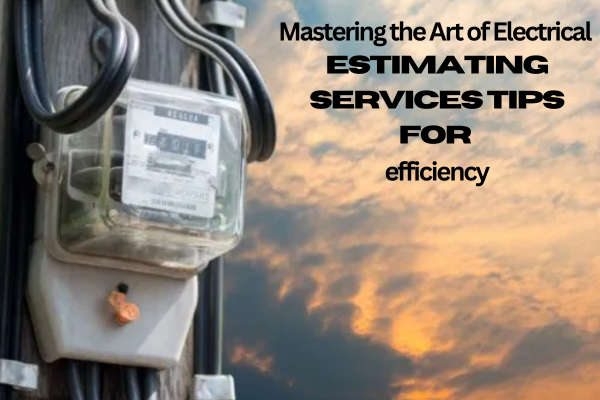In the construction and electrical project sectors, accurate and efficient estimating plays a critical role in achieving success. Electrical estimating services go beyond basic calculations—they involve precision, strategic planning, and expertise. At Precision Estimator, we’re dedicated to simplifying this complex process and providing cost-effective, timely solutions. If you’re a contractor, project manager, or estimator, these strategies can help you master the art of electrical estimating efficiently.
What are Electrical Estimating Services?
Electrical estimating services involve calculating the costs, materials, and labor necessary for an electrical project. This ensures proper budgeting and helps prevent unexpected expenses, making it an essential part of project planning.
Here are practical tips to boost efficiency in electrical estimating services:
1. Adopt Advanced Technology
Modern tools are essential for efficient estimating. Software like Accubid, PlanSwift, and ProEst can streamline calculations, reduce errors, and save time. These solutions enable you to produce detailed, accurate estimates quickly.
Using cloud-based platforms ensures easy data access from anywhere, fostering better collaboration among team members. Integrating estimating tools with project management software also allows real-time adjustments and progress tracking.
2. Keep an Updated Database
An organized and updated database is key to accurate estimating. Ensure you include current information on material prices, labor rates, and supplier details. Regular updates ensure your estimates align with market conditions.
Organizing data into categories such as materials, labor, and equipment can simplify data entry and retrieval during the estimating process, further enhancing efficiency.
3. Understand the Project Scope in Detail
Misinterpreting the project scope can lead to errors and delays. Before starting an estimate, thoroughly review blueprints, specifications, and other documentation. Attending pre-bid meetings and clarifying uncertainties with stakeholders can eliminate misunderstandings.
Comprehensive understanding reduces unforeseen expenses and ensures your estimate is as accurate as possible.
4. Divide the Estimate into Phases
Breaking the project into smaller sections improves focus and accuracy. For instance, categorize tasks into areas like wiring, lighting, power distribution, and control systems. This method helps identify potential issues early, allowing for timely intervention.
Phased estimates also make it easier for stakeholders to understand and approve budget allocations.
5. Utilize Historical Data
Previous project data can serve as a valuable reference. Past performance metrics for labor hours, material costs, and timelines can provide benchmarks for future estimates.
When using historical data, account for differences in project scope, inflation, or changes in technology and regulations that might affect costs.
6. Stay Updated on Industry Trends
The electrical industry evolves constantly with new technologies, materials, and techniques. Staying informed about trends, such as renewable energy systems and smart technologies, helps you create relevant, competitive estimates.
Engage with industry professionals, attend seminars, and read trade publications to remain updated.
7. Prioritize Accuracy Over Speed
While meeting deadlines is important, rushing estimates can result in costly mistakes. Dedicate sufficient time to reviewing calculations to ensure accuracy. Reliable estimates build client trust and minimize future disputes.
Use a checklist to verify that every aspect of the estimate is covered, including permits, overheads, and contingencies.
8. Collaborate with Your Team
Effective estimating often requires teamwork. Collaborating with engineers, project managers, and suppliers provides valuable insights and ensures all project aspects are considered. Open communication helps minimize oversights.
Regular team meetings can help identify challenges and foster knowledge sharing, leading to more accurate estimates.
9. Implement Quality Control Measures
A strong quality control process ensures high standards for your estimates. Cross-checking with senior estimators or using automated validation tools can reduce errors and enhance credibility.
10. Focus on Clear Client Communication
Maintaining open communication with clients is vital. Provide detailed and transparent estimates with explanations for each cost. Encouraging feedback helps build trust and addresses concerns early, preventing misunderstandings.
Why Choose Precision Estimator for Electrical Estimating Services?
At Precision Estimator, we combine cutting-edge technology, industry knowledge, and a client-centric approach to deliver precise, efficient estimates. Whether it’s a minor project or a large-scale initiative, our team ensures every detail is thoroughly assessed.
Also Read
- ► “Discover Corteiz: Stylish Chandal Corteiz for Ultimate Comfort and Fashion”
- ► Chrome Hearts Rings – Bold Style Meets Luxury Craftsmanship”
- ► Top 5 Benefits of Using Dr. James Advance Glutathione Whitening Cream
- ► Expert Guide to Car Fuel Pump Repair and Replacement in the UAE
- ► Advantages of FRP Moulded Gratings in India Industrial applications
- ► A Guide on Styling Women Jackets with Different Outfits
- ► Can Cisco GLC-SX-MMD Provide Your Network with Better Redundancy?
- ► Is Your Business Ready for the Cloud? Choosing the Right Cloud Computing Provider
- ► SBI Long-Term Equity Fund: Simple Way to Save Taxes
- ► What You Need to Know About Cisco GLC-SX-MMD’s Compatibility with Other Devices
- ► Where Can You Book the Best Last-Minute Flights?
- ► Get Expert Engineering Assignment Help in Melbourne
- ► Cisco GLC-TE: The Future of Data Transmission in Network Engineering
- ► Is Cisco GLC-TE the Right Choice for Your Business’s Fiber-Optic Needs?
- ► How Technology Shapes Modern School Education



